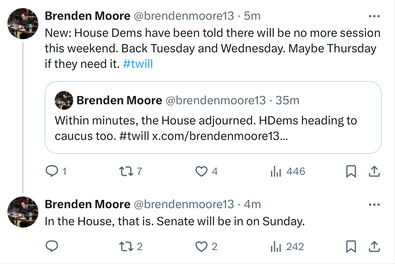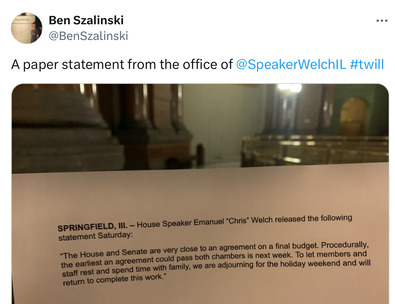|
Harmon: I’m hoping the Senate will be able to wrap up its business tomorrow (Updated)
Saturday, May 25, 2024 - Posted by Rich Miller * Senate President Don Harmon did an impromptu gaggle with reporters tonight on his way to a caucus meeting…
*** Adding *** 
* The paper release…
|
|
Protected: SUBSCRIBERS ONLY - Session stuff (Updated x2)
Saturday, May 25, 2024 - Posted by Rich Miller
|
|
*** Live session coverage ***
Saturday, May 25, 2024 - Posted by Isabel Miller * From Rich: Click here for our end of session cheat sheet. This live coverage software is not automated like the old one was, and today is Isabel’s first time handling these duties. She’s good at everything she does, but help her out in comments, please. Thanks…
|
|
*** 2024 end of session cheat sheet ***
Saturday, May 25, 2024 - Posted by Isabel Miller * FY25 Approp bill - SB251, SA1 * Bonding Authority - SB 3422, HA2 (House Third Reading) * Revenue omnibus - HB4951, SA2 (Senate Third Reading) * Hemp Consumer Products Act - HB4293 * Cannabis omnibus - HB2911 (Senate floor amendments filed) * Medical Debt Relief Act - HB5290 (Senate Third Reading) * Procurement omnibus - HB5511 * Worker Freedom of Speech Act - SB3649 * Carbon Capture and Sequestration (CCS) - SB1289 * Medicaid Omnibus - SB3268, HFA2 * Tax incentives, credits - HB817 (Senate First Reading) * Repeals sub-minimum wage for persons with disabilities - HB793 * Prisoner Review Board reform - HB681 (Senate amendments filed) * Prevents hospital patient abuse - HB587 (Senate First Reading) * Family Amusement Wagering Prohibition Act - SB327, House Amendment 1 * Healthcare Protection Act - HB5395 * Short Term Insurance Ban - HB2499 * Birth equity - HB5142 * Election omnibus - HB4488
|
|
Live coverage
Saturday, May 25, 2024 - Posted by Rich Miller * You can click here or here to follow breaking news. It’s the best we can do unless or until Twitter gets its act together.
|
| « NEWER POSTS | PREVIOUS POSTS » |


















